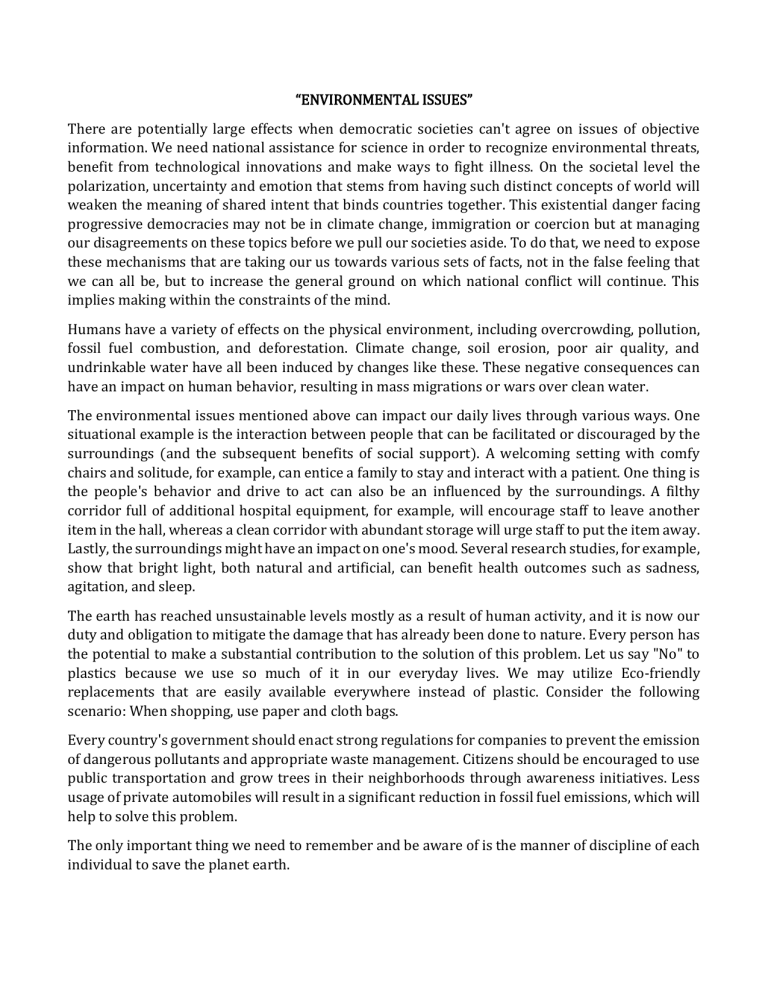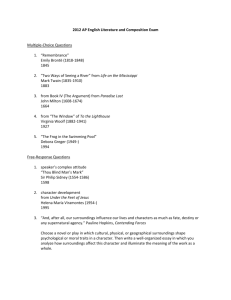Environmental Issues: Impact, Solutions, and Responsibility
advertisement

“ENVIRONMENTAL ISSUES” There are potentially large effects when democratic societies can't agree on issues of objective information. We need national assistance for science in order to recognize environmental threats, benefit from technological innovations and make ways to fight illness. On the societal level the polarization, uncertainty and emotion that stems from having such distinct concepts of world will weaken the meaning of shared intent that binds countries together. This existential danger facing progressive democracies may not be in climate change, immigration or coercion but at managing our disagreements on these topics before we pull our societies aside. To do that, we need to expose these mechanisms that are taking our us towards various sets of facts, not in the false feeling that we can all be, but to increase the general ground on which national conflict will continue. This implies making within the constraints of the mind. Humans have a variety of effects on the physical environment, including overcrowding, pollution, fossil fuel combustion, and deforestation. Climate change, soil erosion, poor air quality, and undrinkable water have all been induced by changes like these. These negative consequences can have an impact on human behavior, resulting in mass migrations or wars over clean water. The environmental issues mentioned above can impact our daily lives through various ways. One situational example is the interaction between people that can be facilitated or discouraged by the surroundings (and the subsequent benefits of social support). A welcoming setting with comfy chairs and solitude, for example, can entice a family to stay and interact with a patient. One thing is the people's behavior and drive to act can also be an influenced by the surroundings. A filthy corridor full of additional hospital equipment, for example, will encourage staff to leave another item in the hall, whereas a clean corridor with abundant storage will urge staff to put the item away. Lastly, the surroundings might have an impact on one's mood. Several research studies, for example, show that bright light, both natural and artificial, can benefit health outcomes such as sadness, agitation, and sleep. The earth has reached unsustainable levels mostly as a result of human activity, and it is now our duty and obligation to mitigate the damage that has already been done to nature. Every person has the potential to make a substantial contribution to the solution of this problem. Let us say "No" to plastics because we use so much of it in our everyday lives. We may utilize Eco-friendly replacements that are easily available everywhere instead of plastic. Consider the following scenario: When shopping, use paper and cloth bags. Every country's government should enact strong regulations for companies to prevent the emission of dangerous pollutants and appropriate waste management. Citizens should be encouraged to use public transportation and grow trees in their neighborhoods through awareness initiatives. Less usage of private automobiles will result in a significant reduction in fossil fuel emissions, which will help to solve this problem. The only important thing we need to remember and be aware of is the manner of discipline of each individual to save the planet earth.


